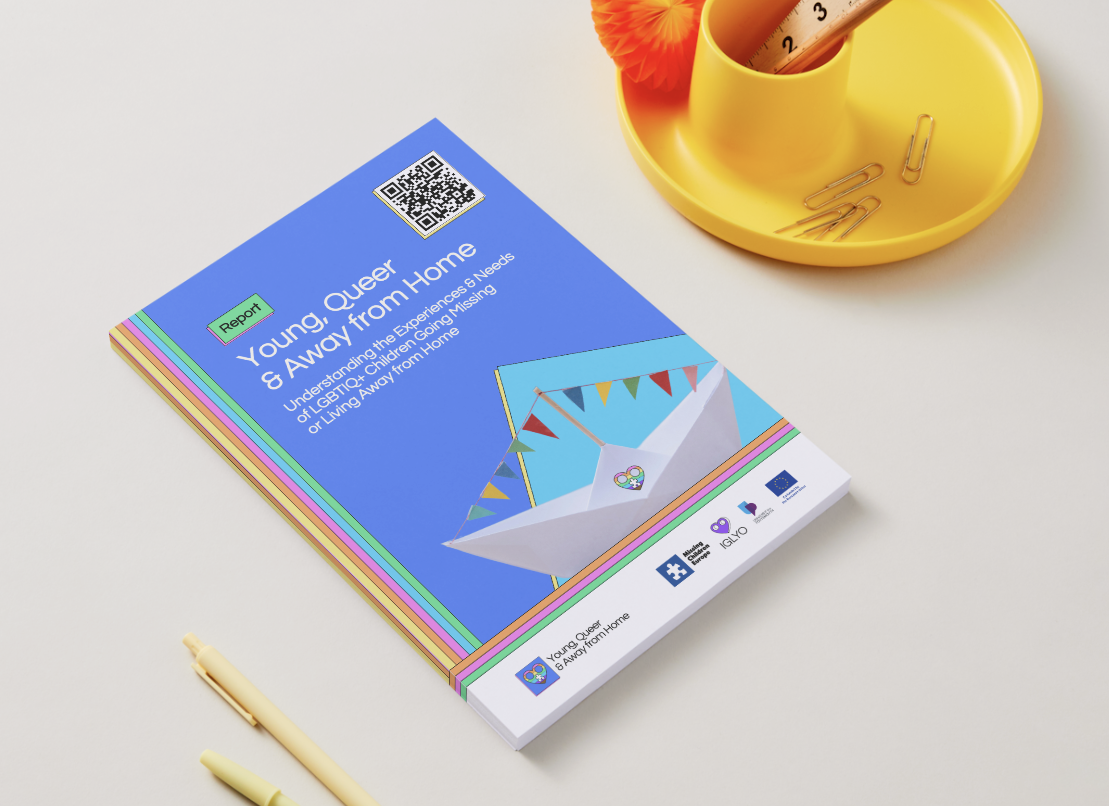Did you know?
Countless LGBTIQ+ young people and children under 18 live away from their home and have to get by on their own. Many are kicked out by their parents or guardians because of who they are; many decide to run away because it has become unsafe for them to stay. Some turn to other relatives and friends; others seek help from social services and shelters.
Yet, not all of them know where to go, and not all social services and professionals are equipped with the right tools and knowledge to support their specific needs. This is where the Young, Queer & Away project comes into play!
Who are we?
Young, Queer & Away from home is a 2-year project studying the views and lived experiences of LGBTIQ+ young people who had to live away from their home before turning 18 in the EU or the UK (e.g. they were kicked out, ran away, were homeless, had to stay in a shelter or with friends/other relatives, etc).
The project is co-led by Missing Children Europe, IGLYO — The International LGBTQI Youth & Student Organisation, and the University of Portsmouth.
What is the project aim?
Through research, an online training for professionals, a resource hub, an awareness raising campaign and policy recommendations, we aim to support LGBTIQ+ young people and children under 18 who are at risk of homelessness and exclusion from their home, as well as to provide relevant professionals and service providers with the right tools to support them.
Who are our target audiences?
The project primarily focuses on LGBTIQ+ young people who experienced living away from home before turning 18 in the EU. Living away from home can include for instance being forced to leave by their parents or legal guardians, running away, having to stay in a shelter or with friends/other relatives, being taken in the custody of social services or foster care, having to seek asylum in another country, and more experiences.
In parallel, the project also focuses on practitioners in the EU or the UK who are likely to support LGBTIQ+ young people and children under 18 who are in these situations, including homeless shelters, social services, child protection services, missing children helplines, and others.
How will we achieve our mission?
In a nutshell, between May 2024 and March 2026, Missing Children Europe, IGLYO, and the University of Portsmouth will perform the following activities:
1. Surveys & Interviews
We are collecting data through interviews and two multilingual surveys: the first one for LGBTIQ+ young people who had to live away from their home before turning 18; the second one for service providers who have already supported them.
2. Report for Professionals
Based on this data, we will develop a report for professionals who can play a role in prevention and support.
3. Online Info Hub
We will map out existing shelters, organisations and services in Europe in an online resource hub for LGBTIQ+ young people and children under 18 at risk of homelessness and exclusion from their home.
4. Online & Offline Training for Professionals
We will develop and deliver an online training for professionals to teach them how to adapt their services to the specific needs of LGBTIQ+ young people and children under 18.
5. Information and awareness-raising campaign
We will run an information and awareness-raising campaign to disseminate the research findings, training resources, info hub, and policy recommendations.
6. Policy recommendations and symposium at the EP
We will draft policy recommendations and organise a policy symposium at the European Parliament to present them to EU and national policy-makers.
Who are our Advisory Boards?
In the course of this project, we are supported by a Youth Board consisting of 5 LGBTIQ+ young people with experience of living away from home before turning 18, as well as a Board of Professionals consisting of 5 experts from various relevant services. Meet the Boards.
Stay tuned!
We'll regularly post updates on this page as the project moves forward.

.png)
“LGBTIQ+ Missing - The voice of LGBTIQ+ young people with experience of going missing before the age of 18” is co-funded by the European Union under the call CERV-2023-EQUAL (project number 101144825).
Many LGBTIQ+ young people and children under 18 decide to leave their home or are forced out because of who they are. Yet, until today, there was no robust, comparable EU-wide evidence on LGBTIQ+ young people and children facing homelessness, living away from home or “going missing”, despite clear signals that identity-based rejection, unsafe environments and barriers to support can drive displacement and harm.
With this in mind, Missing Children Europe, IGLYO, and the University of Portsmouth’s new Young, Queer & Away from Home Study explores and addresses the experiences of LGBTIQ+ young people who faced homelessness, lived away from home or “went missing” before turning 18 in the EU or the UK on the one hand, and the experiences from youth workers and practitioners supporting them on the other hand.
Through an in-depth analysis of survey and interview responses from both these groups, the study first explores the reasons leading LGBTIQ+ youth to leave or be forced out and their experiences while away, before diving into the barriers they face when accessing support and current gaps in existing support services and infrastructure.
The report concludes with putting forward concrete and actionable recommendations for EU institutions, national governments and support services to prevent and address these situations, and ensure adequate support for LGBTIQ+ youth and children facing homelessness and exclusion.
You can download the report here. You can also download only the Policy Recommendations here.
---
For an overview of the key findings, you can access IGLYO's press release, Missing Children Europe's press release, and the University of Portsmouth's press release.

.webp)
This report has been produced with the financial support of the Citizens, Equality, Rights and Values (CERV) 2021-2027 Programme of the European Union. However, the contents of the report are the sole responsibility of the University of Portsmouth, Missing Children Europe and IGLYO and can in no way be taken to reflect the views of the European Commission.
.png)
Young Queer & Supported Online Training: Ensuring safer services for LGBTQI+ children and youth at risk of exclusion and homelessness
Are you a youth worker or youth support service? Have you ever supported lesbian, gay, bi, trans or intersex (LGBTIQ+) young people and children but didn’t know how to cater for their specific needs? We have just the training for you!
Countless LGBTIQ+ young people and children under 18 decide to live away from their home or are forced out because of who they are. While some turn to other relatives or close friends, many are obliged to seek help from social services and professionals who may not be equipped with the right tools and knowledge to support their specific needs. ‘Young, Queer and Supported: Ensuring safer services for LGBTQI+ children and youth at risk of exclusion and homelessness’ is a free online training developed as part of the Young, Queer and Away from Home (YQA) project to address these gaps and strengthen professional responses.
This training aims to equip professionals, volunteers and activists working with young people and children (at risk of) experiencing exclusion, housing insecurity, or homelessness with the tools to address the specific needs of those of them who are LGBTIQ+. Based on the YQA project’s research, this 2-hour live workshop will deepen participants’ understanding of LGBTIQ+ identities and experiences, explain the project’s research findings, and share concrete recommendations on how to identify barriers that limit access to services and render them more accessible and inclusive.
When is it happening?
The training is happening twice in identical sessions, so you can choose the date that fits you best. You can register for the training for free on either of these dates:
Please do not register for more than one date as the session will be the same on both dates.
Who is this training for?
- Professionals working in youth shelters
- Professionals working for child hotlines and helplines
- Professionals working for youth protection and assistance services
- Volunteers and professionals working for youth and children support organisations
- Youth workers more broadly
You need to be 18 years old or above to take part in the training.
What will you learn?
After following this training you will be able to:
- Identify the diversity of LGBTIQ+ identities
- Have more informed conversations with young people who might be questioning their sexuality or gender
- Understand how different discrimination factors intersect and impact some young people more than others
- Better support LGBTIQ+ youth with practical skills and tools
- Recognise barriers and struggles specific to LGBTIQ+ young people and children, informed by the Young, Queer and Away from Home research report
Help us to share the training!
Do you know youth workers or support services that could benefit from this training? Use our communications kit to send the help us to reach more participants!
Code of Conduct
By registering for this event you agree to our participant Code of Conduct.
Questions & Contact
For any questions, please reach out to IGLYO's programme team at programmes@iglyo.org.
.webp)
About the Young, Queer and Away from Home Project
Young, Queer & Away from Home is a 2-year project studying the views and lived experiences of LGBTIQ+ young people who had to live away from their home before turning 18 in the EU or the UK (e.g. they were kicked out, ran away, were homeless, had to stay in a shelter or with friends/other relatives, etc). The project is co-led by Missing Children Europe, IGLYO — The International LGBTQI Youth & Student Organisation, and the University of Portsmouth.
Through research, an online training for professionals, a resource hub, an awareness raising campaign and policy recommendations, we aim to support LGBTIQ+ young people and children under 18 who are at risk of homelessness and exclusion from their home, as well as to provide relevant professionals and service providers with the right tools to support them.
The map below gathers resources spread across Europe that LGBTIQ+ youth in need can contact to ask for direct support or redirection towards competent services. You can use the Map's search tool to type the name of your country and get a list of all the resources available in your area.
The map and guide gather the following resource types:
🏰 LGBTIQ+ Shelters: Organisations providing accommodation and support specifically to LGBTIQ+ young people
🏠 Youth Shelters: Organisations providing accommodation and support specifically to young people
🌈 General LGBTIQ+ Organisations: Organisations who do not provide accommodation but can receive support requests and either support you or redirect you depending on your needs
💬 116 111 Child Helplines: Free numbers offering general advice as well as support and counselling to young people.
☎ 116 000 Missing Children Hotlines: Free numbers specifically for children, young people and adults calling for matters related to going missing.
More resources are being added over time. If you are an organisation providing support to LGBTIQ+ young people in need, you can fill out this form or contact us at network@iglyo.org to appear on the map.
Two paid boards with different expertise and experience support the Consortium partners in the implementation of the Young, Queer & Away from Home project.
Advisory Youth Board
The Advisory Youth Board consists of 6 LGBTIQ+ young people under 25 who had to leave their home before turning 18 years old. Based on their lived experience, the members of the Youth Board contribute to a variety of tasks ranging from advocacy and research to communications and dissemination throughout the project.
Expert Board of Professionals
The Expert Board of Professionals gathers five professionals representing either LGBTIQ+ organisations or service providers from various sectors that come in contact with LGBTIQ+ young people and children who are or are at risk of homelessness and exclusion.
.png)
.png)
.png)
.png)

.png)

.webp)



.webp)






